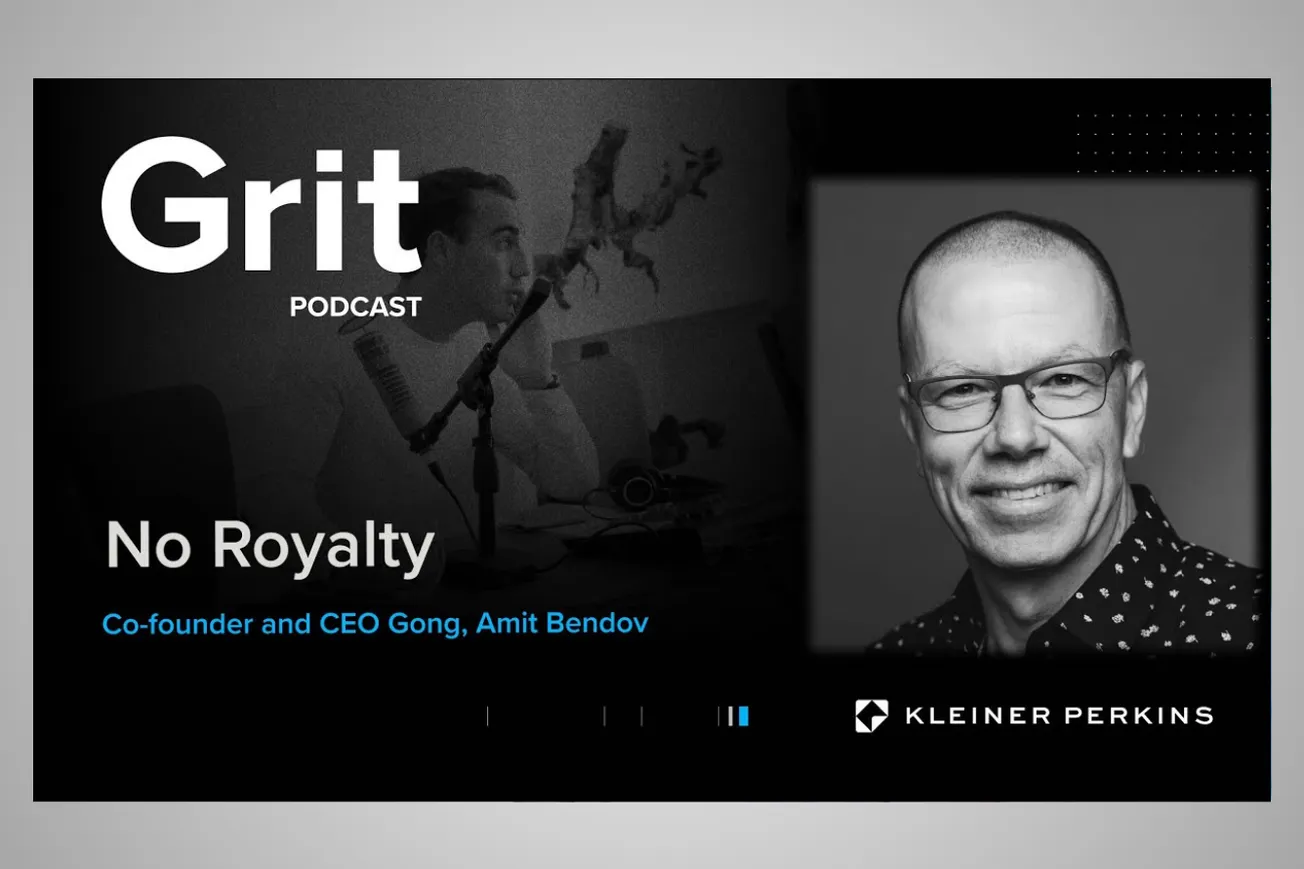Table of Contents
Amit Bendov's journey from rejected startup founder to leading a $7 billion AI company reveals how authentic leadership and systematic human connection create competitive advantages that technology alone cannot replicate.
At 50, when most executives are considering succession planning, Amit Bendov was starting over. After experiencing what he calls "the quarter from hell" as CEO of Sisense—where rapid growth suddenly collapsed with no explanation—he founded Gong with a radical proposition: artificial intelligence could automatically capture and analyze customer conversations to provide insights that traditional CRM systems missed entirely.
Key Takeaways
- Systematic human connection scales through programmatic approaches like "Captain's Table" meetings with memorized employee details
- Starting companies at 50 provides experience advantages that outweigh perceived age disadvantages in venture capital
- AI augments rather than replaces human relationships—the best technology companies combine automation with authentic personal connection
- Revenue intelligence emerged from the gap between what leaders needed to know and what traditional systems could provide
- Company culture stems from founder personality and authentic behavior, not designed values or marketing campaigns
- Long-term vision sustains leadership energy through inevitable challenges and setbacks
- Problem-solving mindset versus opportunity-pursuing mindset fundamentally changes leadership experience and effectiveness
Timeline Overview
- 02:12–14:19 — Systematic Human Connection: Captain's Table program, memorizing employee details, "No Royalty" culture principle, and scaling personal relationships in 1,200-person company
- 14:19–24:58 — Global Leadership: Splitting time between Israel and San Francisco, family as pseudo-co-founders, cultural differences in work approaches, and starting companies in your 50s
- 24:58–34:59 — Fundraising Reality: Early investor rejections despite good metrics, building brand through authentic personality, "win as a team" philosophy derived from Barcelona soccer
- 34:59–48:04 — Leadership Philosophy: Enjoying the ride through ups and downs, embarrassing personal stories that humanize leadership, managing constantly active minds and creativity
- 48:04–END — AI and Human Connection: Paradox of automating sales while emphasizing relationships, GPT breakthroughs, pursuing opportunities versus solving problems, long-term vision for revenue intelligence
Deep Analysis: Systematic Human Connection at Scale
Most CEOs abandon personal relationships as companies grow, defaulting to hierarchical communication and formal processes. Bendov took the opposite approach, systematizing human connection to maintain authenticity at scale. His "Captain's Table" program represents sophisticated thinking about leadership presence in large organizations.
"I take like five or six team members from different corners of the company just to talk [...] she prepares a document for me [...] every meeting I have that and I on my way I read it and I memorize everything."
The preparation process reveals the intentionality behind seemingly casual interactions. Rather than winging conversations with employees, Bendov studies each person's role, tenure, manager, and context before meeting them. This systematic approach enables authentic connection despite the impossibility of naturally remembering details about 1,200 employees.
The "No Royalty" principle—that anyone can communicate with anyone regardless of hierarchy—only works when leadership genuinely models accessibility. Bendov's willingness to invest personal time in memorizing SDR details and engaging in vulnerable storytelling creates cultural permission for others to operate without artificial barriers.
This approach contrasts sharply with traditional executive communication strategies that rely on filtered information and formal channels. By maintaining direct contact across organizational levels, Bendov gathers unfiltered insights about company operations while simultaneously communicating priorities and values through personal interaction.
The scalability challenge becomes managing this systematic approach without it feeling mechanistic or inauthentic. The key lies in genuine curiosity about people and willingness to share personal stories that humanize leadership. Employees can distinguish between performative engagement and authentic interest, making the leader's mindset more important than the programmatic structure.
The Age Advantage in Entrepreneurship
Bendov's experience starting Gong at 50 challenges conventional wisdom about entrepreneurial age limits while revealing advantages that venture capital markets often overlook. His trajectory illustrates how experience can compensate for perceived disadvantages in energy or risk tolerance.
The decades of operational experience provided crucial context for recognizing market gaps that younger founders might miss. His "quarter from hell" at Sisense—where traditional analytics couldn't explain sudden revenue decline—created the insight that led to Gong's founding. This problem recognition required deep understanding of enterprise sales dynamics that typically comes only through extensive operational experience.
The fundraising challenges Bendov faced despite strong business metrics reveal persistent biases in venture capital toward younger founders. Investors' concerns about competition from Google and Amazon, skepticism about sales team adoption, and general resistance to sales-focused software reflected pattern matching rather than careful analysis of market opportunity or founder capability.
However, the experience advantage manifested in strategic patience and operational discipline that many younger founders lack. Bendov's approach to product development, team building, and market positioning demonstrated sophistication that comes from multiple business cycles and previous leadership roles. His ability to maintain long-term vision while managing short-term execution reflects maturity that age provides.
The family dynamics also differed significantly from typical startup founders. Rather than seeking family understanding for entrepreneurial sacrifice, Bendov approached company founding as a family decision requiring explicit buy-in. This mature approach to work-life integration created sustainable support systems that enable long-term leadership effectiveness.
AI Innovation Through Human-Centered Design
The apparent paradox between building AI-powered automation while emphasizing human relationships reveals sophisticated thinking about technology's role in business operations. Gong's success stems from understanding that artificial intelligence amplifies rather than replaces human connection.
Traditional CRM systems failed because they required human data entry that sales teams resented and performed reluctantly. The resulting data was sparse, subjective, and often inaccurate. Bendov's insight was that automatic conversation capture could provide comprehensive, objective data while reducing administrative burden on sales professionals.
"AI does not replace people it's replaced some of the chores that you know that they hate anyway so everybody wins."
This perspective reframes AI development around human empowerment rather than human replacement. By automating data collection and analysis, Gong enables sales professionals to focus on relationship building and strategic thinking—activities that require uniquely human capabilities like empathy, creativity, and complex reasoning.
The human-centered approach extends to company culture and leadership philosophy. Bendov's emphasis on personal storytelling, authentic relationship building, and vulnerable leadership creates organizational context that technology cannot replicate. The combination of sophisticated AI capabilities with genuine human connection becomes a competitive moat that pure technology companies struggle to replicate.
The "Google for Enterprise" metaphor illustrates the transformational potential of this approach. Just as Google automated and improved information discovery compared to human-curated directories, Gong automates and improves revenue intelligence compared to manually-entered CRM data. The result is quantitatively more data and qualitatively better insights that enable superior business decisions.
Leadership Energy and Long-Term Vision
Bendov's approach to sustaining leadership energy over extended periods illustrates mature thinking about entrepreneurial endurance that many founders never develop. His framework of pursuing opportunities rather than solving problems fundamentally changes the psychological experience of leadership challenges.
The "art of company building" perspective reframes entrepreneurship as creative expression rather than just business optimization. This artistic view provides intrinsic motivation that sustains energy through inevitable setbacks and failures. Like artists who persist through criticism and commercial disappointment, Bendov derives satisfaction from the creative process itself rather than just external validation.
"I actually even like enjoy that [...] when there's a problem there's an opportunity to respond quickly and with the intensity and ferocity right that people sometimes forget so it's always like it's like a Thrill Ride."
This mindset transformation enables leaders to maintain enthusiasm during difficult periods rather than just enduring them. Challenges become opportunities for creative problem-solving and team mobilization rather than sources of stress and anxiety. The psychological reframing creates sustainable energy that enables long-term leadership effectiveness.
The "enjoy the ride" philosophy requires accepting both success and failure as temporary states rather than permanent identities. This emotional equilibrium prevents the euphoria of success or despair of setbacks from compromising decision-making quality. Leaders who can maintain perspective during extreme conditions make better strategic choices and inspire greater team confidence.
The long-term vision component provides context that makes short-term challenges manageable. When leaders genuinely believe in multi-decade impact potential, quarterly setbacks or competitive threats feel less threatening. This temporal perspective enables patient capital allocation and strategic thinking that creates sustainable competitive advantages.
Global Leadership and Cultural Navigation
Bendov's approach to leading across Israeli and American cultures while maintaining family relationships illustrates sophisticated thinking about global leadership that extends beyond traditional international business considerations.
The cultural differences between Israeli directness and American communication styles create natural tensions in global organizations. Israeli culture's emphasis on direct feedback and informal hierarchy can clash with American preferences for diplomatic communication and formal structure. Bendov's ability to navigate these differences while maintaining authentic personality demonstrates cultural intelligence that many global leaders struggle to develop.
The family integration aspect reveals mature approaches to work-life balance that prioritize long-term relationship sustainability over short-term convenience. Rather than relocating family for business optimization, Bendov designed a commuting schedule that preserves family stability while meeting business requirements. This approach requires exceptional time management and energy discipline but creates more sustainable leadership over extended periods.
The geographic distribution also enables unique perspectives on remote work dynamics that became crucial during recent global shifts. Having operated distributed teams long before remote work became mainstream, Bendov developed insights about when physical presence creates value versus when distributed collaboration suffices. His observations about in-person benefits for new employees and collaborative roles provide practical frameworks for hybrid work decisions.
Brand Building Through Authentic Personality
Gong's distinctive brand presence illustrates how authentic founder personality can create organizational differentiation that marketing campaigns cannot replicate. The purple and fuchsia colors, playful communication style, and emphasis on genuine human connection stem directly from Bendov's personality rather than designed brand strategy.
The "beige" rejection—refusing to blend into undifferentiated corporate communication—creates memorable experiences that facilitate business development and talent attraction. In enterprise software markets where most vendors sound similar, authentic personality becomes a competitive advantage that influences buying decisions and employee engagement.
"People buy from people right and people think that you you know if you're like an Enterprise software you need to be like fully buttoned up very formal [...] we always took Q from the great like consumer marketing products we were like you know like apple and Tesla more than some of the like IBM."
This insight challenges conventional B2B marketing wisdom that emphasizes professional credibility over personality. Bendov recognized that enterprise buyers are still humans who respond to authentic connection and memorable experiences. The consumer marketing inspiration enables emotional engagement that purely rational positioning cannot achieve.
The approach also enables employee brand building where individual team members develop personal followings that amplify company reach. Rather than constraining communication through corporate messaging, Gong encourages personality expression that creates multiple brand ambassadors throughout the organization. This distributed approach scales authentically in ways that centralized marketing cannot replicate.
Conclusion
Amit Bendov's leadership journey demonstrates that sustainable technology company building requires combining cutting-edge innovation with timeless human connection principles. His systematic approach to personal relationships, mature perspective on entrepreneurial challenges, and authentic brand building create competitive advantages that pure technology capabilities cannot replicate. Most importantly, his framework of pursuing opportunities rather than solving problems illustrates how leadership mindset fundamentally determines both company outcomes and personal sustainability. The integration of advanced AI capabilities with genuine human-centered culture provides a blueprint for technology leadership that serves both business success and human flourishing.
Practical Implications for Technology Leaders
- Systematize human connection: Create programmatic approaches for maintaining personal relationships as organizations scale beyond natural relationship limits
- Leverage experience advantages: Recognize that operational depth and pattern recognition provide entrepreneurial advantages that can outweigh age-related perceptions
- Combine AI with human focus: Design technology solutions that augment rather than replace human capabilities, creating mutual benefit rather than displacement anxiety
- Maintain long-term vision: Develop temporal perspective that makes short-term challenges manageable while sustaining leadership energy over extended periods
- Build authentic brands: Let genuine personality drive brand differentiation rather than designing artificial corporate personas that lack emotional resonance
- Navigate global cultures: Develop cultural intelligence that preserves authentic communication while respecting different operational styles and relationship norms
- Reframe leadership psychology: Shift from problem-solving to opportunity-pursuing mindset to maintain enthusiasm during inevitable difficulties
- Integrate family decisions: Approach major career transitions as family choices requiring explicit buy-in rather than individual decisions requiring family accommodation
- Enable distributed brand building: Encourage individual personality expression throughout organizations to create multiple authentic ambassadors rather than constraining communication
- Sustain creative perspective: Maintain artistic view of company building that provides intrinsic motivation independent of external validation or market performance





![This New Bitget Platform Changes the Game [Literally Gold]](/content/images/size/w1304/format/webp/2026/02/bitget-launches-universal-exchange-gold-usdt.jpg)